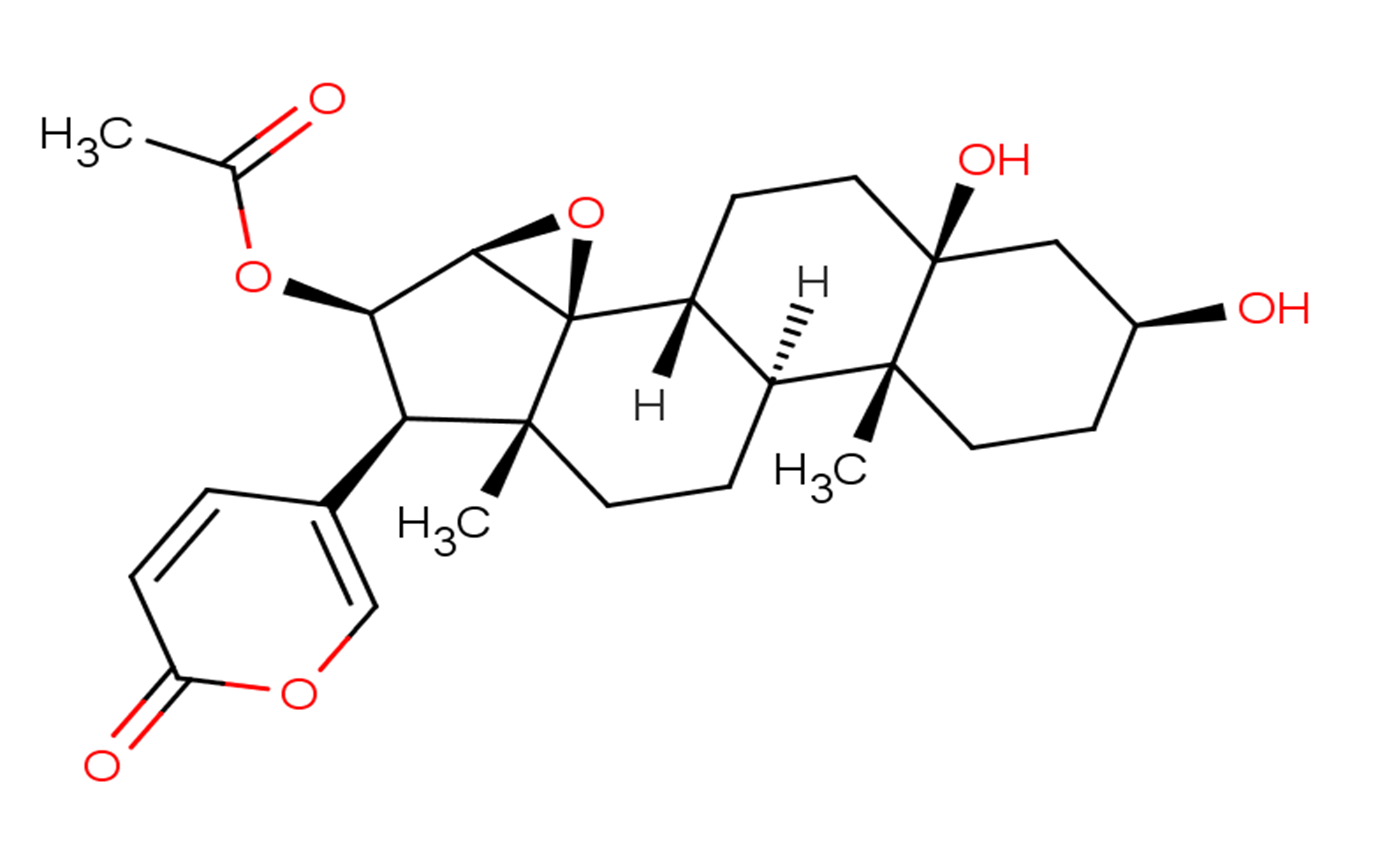
Cinobufotalin
CAS No. 1108-68-5
Cinobufotalin( —— )
Catalog No. M23309 CAS No. 1108-68-5
Cinobufotalin is a main cardiac toxin in toad, it is a novel anti-HCC agent, it induces growth inhibition and apoptosis in cultured HCC cells through ceramide production.
Purity : >98% (HPLC)
 COA
COA
 Datasheet
Datasheet
 HNMR
HNMR
 HPLC
HPLC
 MSDS
MSDS
 Handing Instructions
Handing Instructions
| Size | Price / USD | Stock | Quantity |
| 2MG | 56 | In Stock |


|
| 5MG | 80 | In Stock |


|
| 10MG | 135 | In Stock |


|
| 25MG | 226 | In Stock |


|
| 100MG | Get Quote | In Stock |


|
| 200MG | Get Quote | In Stock |


|
| 500MG | Get Quote | In Stock |


|
| 1G | Get Quote | In Stock |


|
Biological Information
-
Product NameCinobufotalin
-
NoteResearch use only, not for human use.
-
Brief DescriptionCinobufotalin is a main cardiac toxin in toad, it is a novel anti-HCC agent, it induces growth inhibition and apoptosis in cultured HCC cells through ceramide production.
-
DescriptionCinobufotalin is a main cardiac toxin in toad, it is a novel anti-HCC agent, it induces growth inhibition and apoptosis in cultured HCC cells through ceramide production. Cinobufotalin is also an effective reversal agent for the multidrug resistance of tumors, it can reverse the adriamycin-resistance in Raji/ADR cells and the expression of P-gp and MRP-1 proteins. Cinobufotalin can promote the dendritic cells(DCs) derived from peripheral blood of patients with chronic hepatitis B to mature and effectively enhance its(the DCs') capabilities, therefore the treatment of cinobufotalin may potentiate the antiviral immunity of the patients with chronic hepatitis B(CHB).
-
In VitroCell Cytotoxicity Assay Cell Line:A549, H460 and HTB-58 human lung cancer cells Concentration:0.1 μM, 0.5 μM, 1 μM, 5 μM, 10 μM Incubation Time:72 hours Result:Significantly induced cell death in a concentration-dependent manner.
-
In VivoAnimal Model:Male nude mice (4-6 weeks old, BALB/c) with A549 cells Dosage:1 mg/kg or 5 mg/kg Administration:Intraperitoneal injection; twice daily; for 1 weeks Result:Inhibited A549 lung cancer cell growth in vivo.
-
Synonyms——
-
PathwayCytoskeleton/Cell Adhesion Molecules
-
TargetAkt
-
RecptorAkt|IL Receptor|MRP1|P-gp
-
Research Area——
-
Indication——
Chemical Information
-
CAS Number1108-68-5
-
Formula Weight458.54
-
Molecular FormulaC26H34O7
-
Purity>98% (HPLC)
-
SolubilityDMSO:35 mg/mL (76.33 mM)
-
SMILESC[C@]([C@@H](C(C=C1)=COC1=O)[C@H]2OC(C)=O)(CC[C@@]3([H])[C@@]4([H])CC[C@@]5(O)[C@@]3(CC[C@H](O)C5)C)[C@@]64[C@@H]2O6
-
Chemical Name——
Shipping & Storage Information
-
Storage(-20℃)
-
ShippingWith Ice Pack
-
Stability≥ 2 years
Reference
1.Ceramide production mediates cinobufotalin-induced growth inhibition and apoptosis in cultured hepatocellular carcinoma cells. Tumour Biol. 2015 Feb 28.
molnova catalog



related products
-
Pachymic acid
Pachymic acid is a natural product, and inhibits Akt and ERK signaling pathways.Pachymic acid(PA) exhibited anti-tumor effects in vitro accompanied by induction of G2/M phase arrest and apoptosis in NCI-H23 and NCI-H460 lung cancer cells.?
-
AKT-IN-6
AKT-IN-6 (INCB-047775) has an inhibitory effect on ATK. Akt is an important component of cellular signaling for growth factors, cytokines, and other cell stimuli.
-
K-80003
K-80003(TX-803) is a potent retinol-like X-receptor-alpha regulator that inhibits TRxrα-dependent Akt activation and tumor cell growth.



 Cart
Cart
 sales@molnova.com
sales@molnova.com


